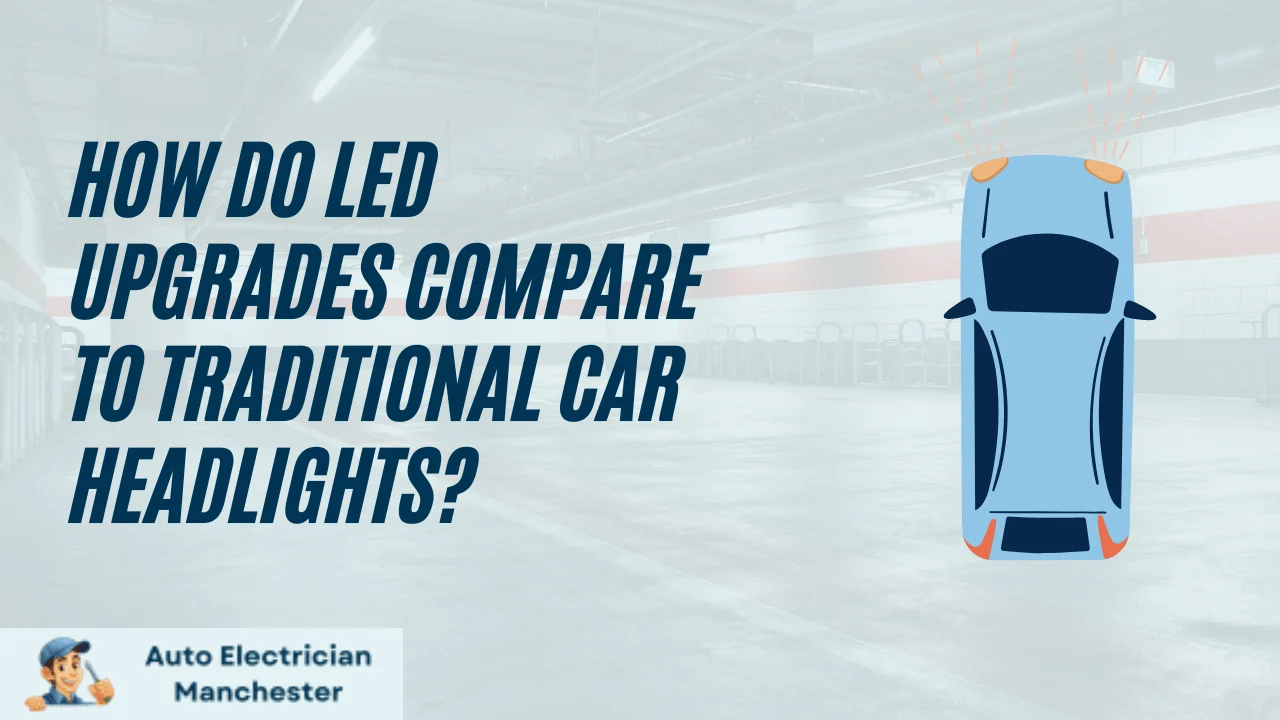
For decades, halogen headlights have been the standard for illuminating the road ahead. However, a new era of automotive lighting has arrived with the surge of LED headlight upgrades. But are LEDs truly a brighter path for drivers? This article dives deep into the world of LED upgrades, comparing them to traditional halogen headlights across various aspects to help you make an informed decision.
Advantages of LED Upgrades
LED (Light Emitting Diode) headlights hold several advantages over their halogen counterparts. Let’s delve into these key benefits:
Illuminating the Way: LED headlights boast superior brightness and clarity. They emit a crisp, white light that closely resembles natural daylight. This, in contrast to the yellowish glow of halogens, can significantly improve nighttime visibility and potentially reduce driver fatigue during extended journeys. However, it’s crucial to choose LED upgrades that precisely replicate the halogen beam pattern. Poorly designed aftermarket bulbs can scatter light, creating glare for oncoming traffic.
Efficiency on the Road: Embrace energy-saving champions! Compared to halogens, LEDs are champions of efficiency, consuming up to 75% less power. This translates to potential fuel economy gains, particularly for electric vehicles where every watt saved extends mileage. Additionally, LEDs generate less heat, reducing stress on headlight housings and potentially extending their lifespan.
Long-lasting Luminaries: LED headlights are the undisputed marathon runners in the lighting world. They boast lifespans exceeding 30,000 hours, compared to a mere 1,000 hours for halogen bulbs. This translates to fewer replacements and significant cost savings in the long run. Imagine years of worry-free nighttime driving without the hassle of frequent bulb changes!
Considerations Before Upgrading
While LED upgrades offer a compelling package of benefits, there are a few crucial points to consider:
Compatibility is Key: Not all LED upgrades are created equal. Improperly designed bulbs can significantly compromise beam patterns, potentially affecting light distribution and creating safety hazards. Ensure the chosen upgrade is fully compatible with your vehicle’s specific headlight assembly. Consulting a qualified mechanic or referring to your car’s owner’s manual for recommended upgrades is highly recommended.
Regulation Reigns Supreme: Upgrading your headlights requires adhering to regulations set by the Department of Transportation (DOT). Ensure the LED kit you choose carries DOT approval. Non-compliant upgrades can be illegal and pose safety risks. Opting for LED kits from reputable brands that prioritize quality and adherence to regulations is crucial.
LED Headlight Upgrades
While LED headlights offer numerous advantages, some concerns linger in the minds of potential users. Let’s address these common anxieties to illuminate a clear path towards informed decision-making.
Beam Pattern Blues:
As mentioned earlier, a critical aspect of LED upgrades is ensuring the beam pattern closely matches the original halogen setup. Misaligned beams can scatter light, creating glare for oncoming drivers and compromising your own nighttime visibility. Here’s how to navigate this concern:
Projector Headlights and LED Upgrades: Project headlights utilize a lens to focus and project light, making them ideal for LED upgrades. The projector housing inherently controls the beam pattern, ensuring a more precise and consistent light distribution compared to reflector headlights.
Reflector Headlights and LED Upgrades: Reflector headlights rely on the shape of the reflector to direct light. Here, choosing an LED upgrade designed specifically for reflector housings is crucial. Opt for bulbs that mimic the filament placement of halogen bulbs to achieve a proper beam pattern.
Professional Guidance: If you’re unsure about compatibility or beam pattern accuracy, consulting a qualified mechanic is highly recommended. They can assess your vehicle’s headlight assembly and recommend suitable LED upgrades or perform the installation itself, ensuring optimal performance and safety.
Heat Management:
Although LEDs generate less heat than halogens, proper heat dissipation is still essential for optimal performance and lifespan. Look for LED upgrades that incorporate efficient heat sinks. These heat sinks draw heat away from the LED chip, preventing overheating and ensuring long-lasting illumination.
Daytime Running Lights (DRLs) and LED Upgrades:
Daytime Running Lights (DRLs) are a safety feature that improves a vehicle’s daytime visibility. Some vehicles utilize the headlights themselves as DRLs. In such cases, ensure the chosen LED upgrade is designed for DRL use. Opting for a dual-function LED bulb that functions as both a DRL and a headlight eliminates the need for separate bulbs.
Additional Benefits of LED Headlights
Beyond the core advantages already discussed, LED headlights offer a range of additional benefits that enhance the driving experience:
Faster Response Time: LEDs activate significantly faster than halogen bulbs. This translates to quicker illumination when switching on the headlights, providing a safety advantage in low-light situations or when entering tunnels.
Wider Color Spectrum: LEDs are capable of producing a wider color spectrum compared to halogens. This opens doors for future developments in headlight technology, such as adaptive headlights that can dynamically adjust color temperature to improve visibility in different weather conditions.
Design Versatility: LEDs are compact and offer design flexibility compared to traditional halogen bulbs. This allows for the creation of more modern and aesthetically pleasing headlight designs, enhancing the overall look of your vehicle.
The Verdict
LED headlight upgrades offer a compelling combination of energy efficiency, exceptional lifespan, and potentially improved nighttime visibility. However, ensuring proper compatibility and a beam pattern that mimics the original halogen setup is vital to avoid creating hazards for yourself and other drivers. Consulting a qualified mechanic before upgrading is highly recommended. By making an informed decision, you can embrace the brighter future of LED technology and illuminate the road ahead with confidence.
FAQ
Will LED headlights fit my car?
Compatibility can vary depending on the make and model of your car. Consulting your car’s owner’s manual or a qualified mechanic is the best way to determine if LED upgrades are compatible with your vehicle.

David Mack is a seasoned writer with a passion for the auto electrician niche. With years of hands-on experience and a knack for demystifying complex topics, David brings practical insights to his readers. Whether you’re a professional or a car enthusiast, his engaging articles offer valuable tips and trends in auto electrical systems.
